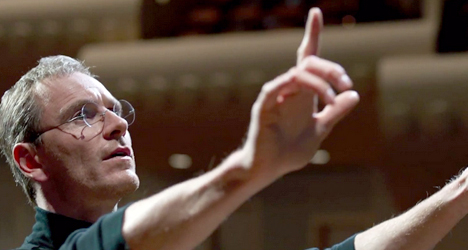Starring: Michael Fassbender, Kate Winslet, Seth Rogen
Directed by: Danny Boyle (“127 Hours”)
Written by: Aaron Sorkin (“The Social Network”)
Never mind that Oscar-nominated actor Michael Fassbender (“12 Years a Slave”) looks nothing like the late Apple co-founder Steve Jobs. We all know from the uninspired 2013 biopic “Jobs,” which starred Ashton Kutcher in the title role, how making that the priority can end up not having much of an effect on the final product, especially when the script is about as interesting as binary code. Fortunately, in the latest Steve Jobs biography, aptly titled “Steve Jobs,” the screenplay and Fassbender are the stars of the show and give the iconic computer genius a film worthy of his contribution to the tech industry.
Based on the book by of the same name by Walter Isaacson, Oscar-winning screenwriter Aaron Sorkin (“The Social Network”), delivers the type of fast-paced, sharp Sorkinesque dialogue he’s been known for throughout his career. Like his character Mark Zuckerberg in “The Social Network,” Sorkin has another larger-than-life leading man to express his biting quips and sarcasm as well as some heartfelt emotion into Fassbender’s Jobs. Sorkin also sets Jobs’ story in a unique way very few writers would dare to attempt when tackling the life of a man most would need a miniseries to capture truthfully.
In “Steve Jobs,” Sorkin takes audiences into Jobs’ life during three prominent milestones of his career – the 1984 launch of the Macintosh, the 1988 launch of the NeXT computer, and the 1998 launch of the iMac. Each of these “backstage” vignettes transports moviegoers into the inner workings of the high-profile launches and examines how Jobs handled the pressure of each event. We also get an incredible glimpse at Jobs’ interaction with Apple coworkers, most notably his longtime assistant Joanna (a wonderful Kate Winslet), who is the most consistent figure in his life, and his role as a reluctant father to his young estranged daughter he refuses to recognize.
Sorkin paints a thought-provoking picture of Jobs. Much of it is not a flattering one for his personality, but it does sing his praises as someone who is able to take control of any situation and be the conductor of his own symphony, as Sorkin so skillfully writes. While Danny Boyle does a satisfactory job at staging these events, nothing screams out that this is a Boyle film. Still, with Fassbender leading the way in this dialogue-heavy drama, “Steve Jobs” says a lot more than the average cradle-to-the-grave story. It might be Fassbender’s symphony, but Sorkin’s the maestro of the entire suite.

